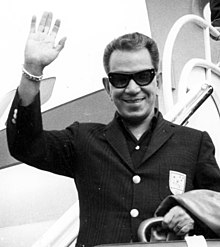
Back Cantinflas AN كانتنفلاس Arabic كانتنفلاس ARZ Cantinflas AST Cantinflas Aymara ক্যান্টিনফ্লাস Bengali/Bangla Cantinflas Breton Cantinflas Catalan Cantinflas Czech Cantinflas German
Cantinflas | |
|---|---|
 Cantinflas in 1964 | |
| Born | Mario Fortino Alfonso Moreno Reyes 12 August 1911 Santa María la Redonda, Mexico City, Mexico |
| Died | 20 April 1993 (aged 81) Mexico City, Mexico |
| Burial place | Panteón Español, Mexico City, Mexico |
| Other names | Mario Moreno |
| Education | Instituto Politecnico Nacional Chapingo Autonomous University (Agronomy, few months) |
| Occupation(s) | Comedian, actor, screenwriter, film producer, singer |
| Years active | 1937–1993 |
| Political party | Institutional Revolutionary Party |
| Spouse |
Valentina Ivanova Zubareff
(m. 1936; died 1966) |
| Children | Mario Arturo Moreno |
| Website | www |
Mario Fortino Alfonso Moreno Reyes (12 August 1911 – 20 April 1993), known by the stage name Cantinflas (Spanish pronunciation: [kanˈtiɱflas]), was a Mexican comedian, actor, and filmmaker. He is considered to have been the most widely accomplished Mexican comedian and is well known throughout Latin America and Spain.
His humor, loaded with Mexican linguistic features of intonation, vocabulary, and syntax, is beloved in all the Spanish-speaking countries of Latin America and in Spain. His abilities gave rise to a range of expressions based on his stage name, including: cantinflear, cantinflada, cantinflesco, cantifleando and cantinflero.
He often portrayed impoverished farmers or peasants of pelado origin.[1] The character allowed Cantinflas to establish a long, successful film career that included a foray into Hollywood. Charlie Chaplin once commented that he was the best comedian alive,[2] and Moreno has been referred to as the "Charlie Chaplin of Mexico".[3][better source needed]
To audiences in most of the world, he is best remembered as co-starring with David Niven in the Oscar-winning film Around the World in 80 Days, for which Moreno won a Golden Globe Award for Best Actor – Motion Picture Musical or Comedy.[4]
As a pioneer of the cinema of Mexico, Moreno helped usher in its golden era. In addition to being a business leader, he also became involved in Mexico's complex labor politics. His reputation as a spokesperson for the working class gave his actions authenticity and became important in the early struggle against charrismo, the ruling PRI's practice of co-opting and controlling trade unions.[citation needed]
Moreover, his character Cantinflas, whose identity became enmeshed with his own, was examined by media critics, philosophers, and linguists, who saw him variously as a danger to Mexican society, a bourgeois puppet, a verbal innovator, and a picaresque underdog.[citation needed]
- ^ "The peladito is the creature who came from the carpas with a face stained with flour or white paint, dressed in rags, the pants below the waist and covered with patches, the belt replaced by an old tie, the peaked cap representing a hat, the ruffled underwear that shows at any provocation, the torn shirt, and gabardine across his left shoulder." – Cantiflas
- ^ Candelaria, Cordelia; Arturo J. Aldama; Peter J. Garcia (2004). Encyclopedia of Latino Popular Culture: Volume I, A-L. Greenwood. p. 103. ISBN 0-313-33210-X.
- ^ Cantinflas biography by Allmovie Retrieved 24 January 2006. [dead link]
- ^ "- Cantinflas". Golden Globes. Retrieved 2 July 2024.